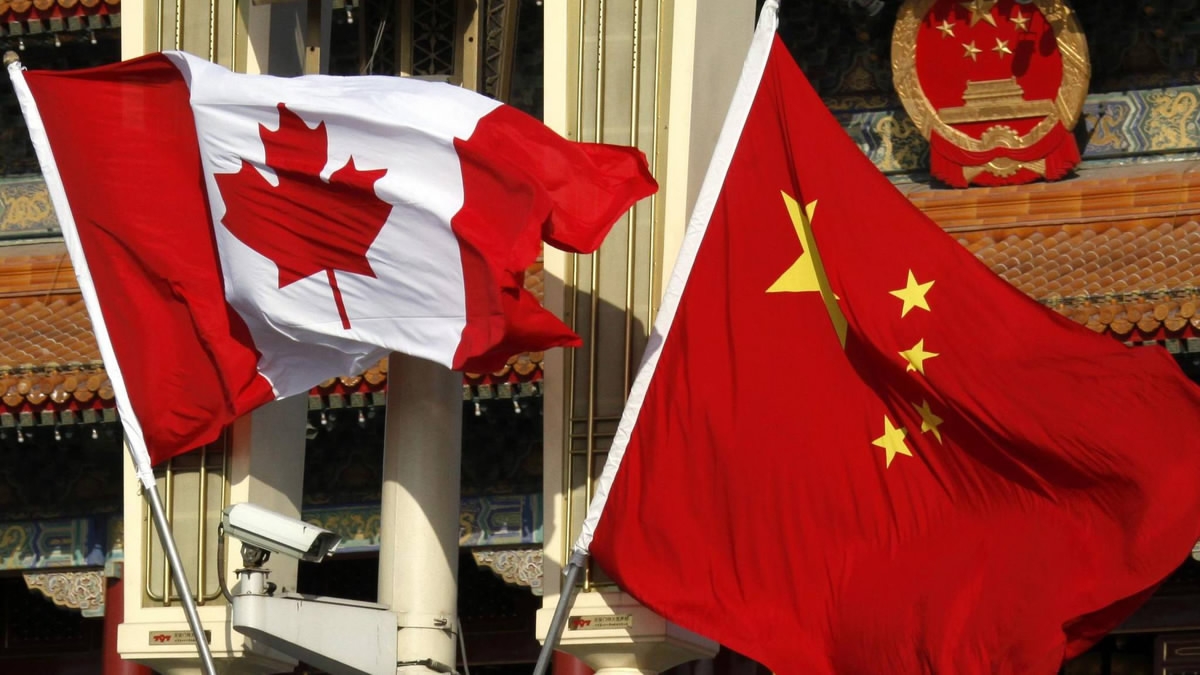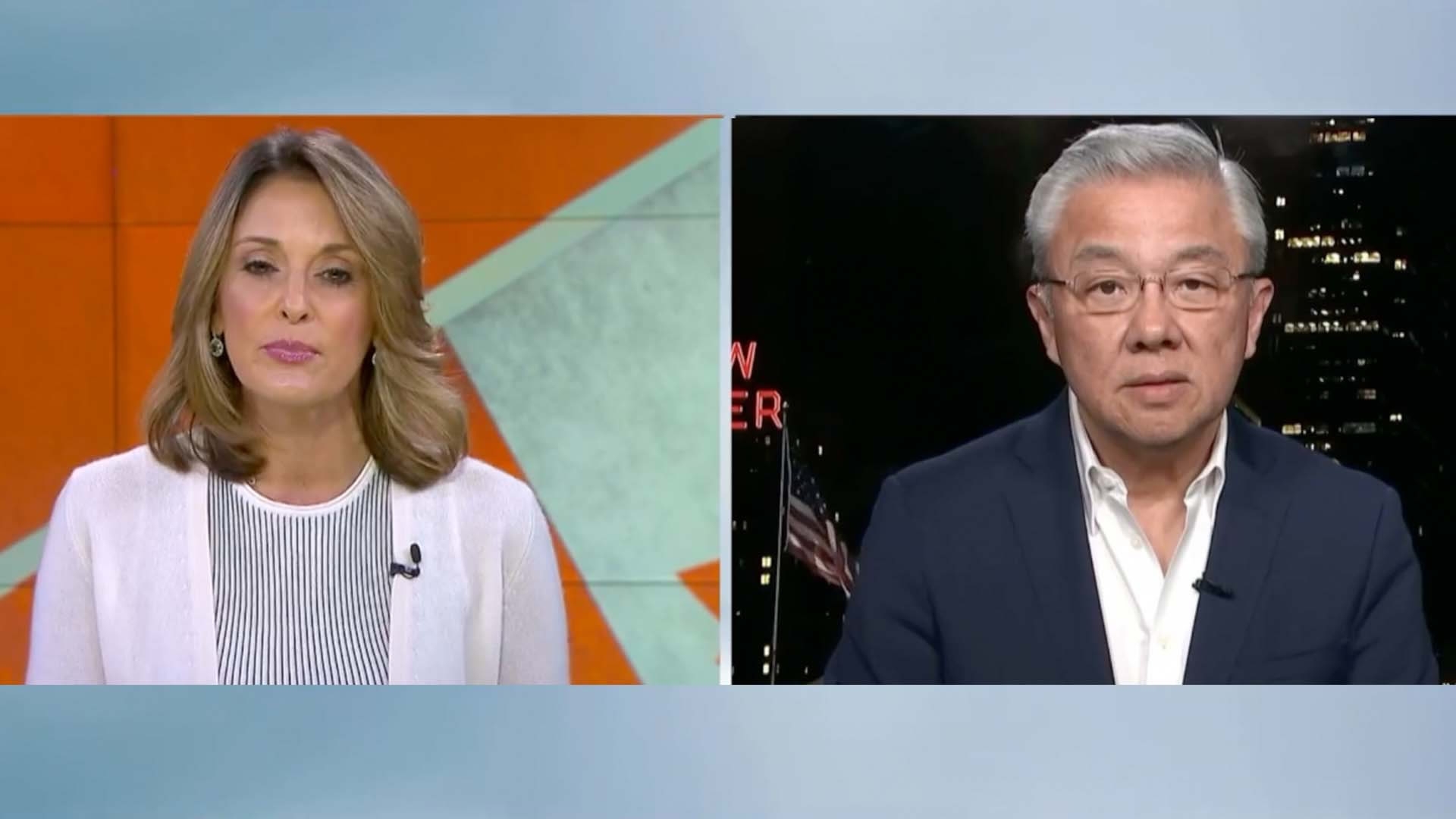Relations between China and Canada have entered a "golden era", said Chinese Premier Li Keqiang, following Prime Minister Justin Trudeau's visit to Beijing.
Trudeau, who came into power in 2015,
met President Xi Jinping and Li during his stay in the Chinese capital, with both sides saying that bilateral talks had been productive.
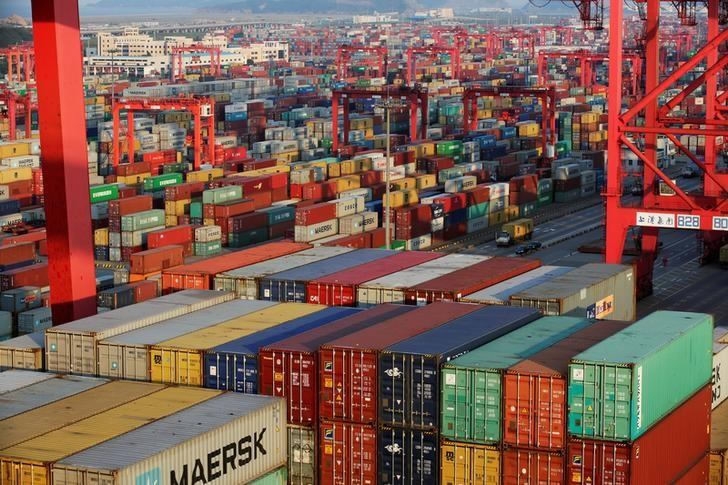
Container boxes at the Yangshan Deep Water Port, part of the Shanghai Free Trade Zone, September 24, 2016. /Reuters Photo
Container boxes at the Yangshan Deep Water Port, part of the Shanghai Free Trade Zone, September 24, 2016. /Reuters Photo
No China-Canada FTA yet
While Trudeau inked various trade deals with Beijing, he confirmed on Tuesday that there would not be any announcement on the highly-anticipated free trade agreement.
However, Beijing and Ottawa would continue to engage in free trade talks, Trudeau told reporters on Tuesday, stressing that both sides are serious about the negotiations and striking a mutually beneficial deal.
Both countries free trade agreement discussions over a year ago, and from February to August this year held three rounds of exploratory talks.
Premier Li said China will continue to explore opportunities for a free trade deal while Trudeau also expressed his optimism, saying that trade talks have been productive.
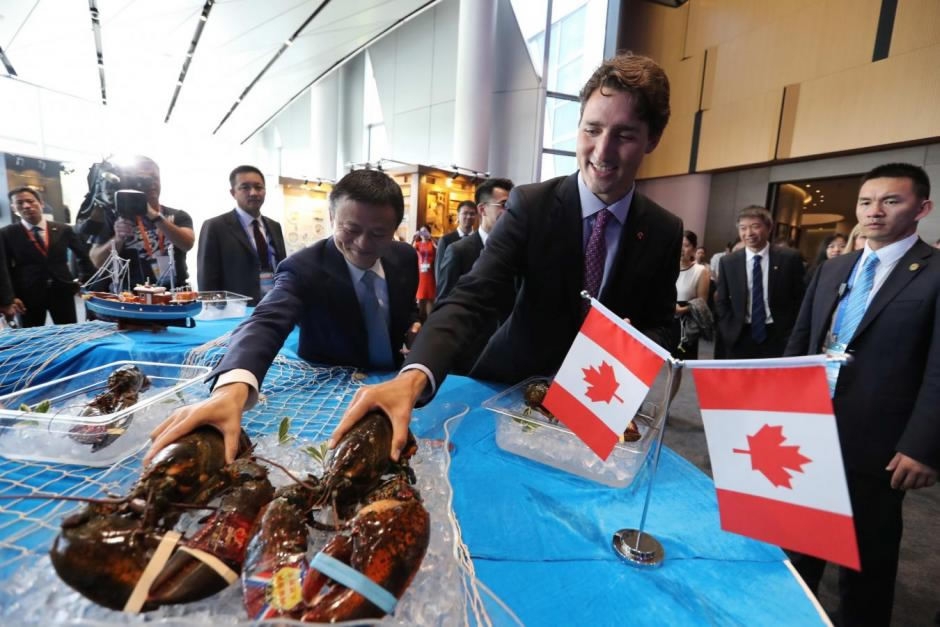
Canada's Prime Minister Justin Trudeau picks up a lobster during a meeting with Jack Ma, Chairman and chief executive of Alibaba Group, at the company's campus in Hangzhou, September 3, 2016. /Reuters Photo
Canada's Prime Minister Justin Trudeau picks up a lobster during a meeting with Jack Ma, Chairman and chief executive of Alibaba Group, at the company's campus in Hangzhou, September 3, 2016. /Reuters Photo
The decision is important not only to entrepreneurs but to ordinary Canadians too and both sides have decided to proceed slowly, Trudeau said.
On Monday, Li and Trudeau witnessed the signing of a series of agreements, covering agriculture, energy cooperation, education and tourism.
Beijing agreed to give Canadian exporters of beef and pork greater access to the Chinese market, but did not provide any further details.
China is Canada’s second-largest trading partner, with bilateral trade reaching 66.4 billion US dollars in 2016.
Last year, four percent of Canada’s exports went to China, up from 0.9 percent in 2000.
NAFTA talks stall
Observers say Trudeau's visit shows Canada's attempts to diversify its trade with China, a move seen as important as US President Donald Trump routinely says he wants to pull out the North American Free Trade Agreement (NAFTA) with Canada and Mexico.
Trump has described NAFTA as a disaster and intends to renegotiate the agreement on terms that are better for US workers and businesses.
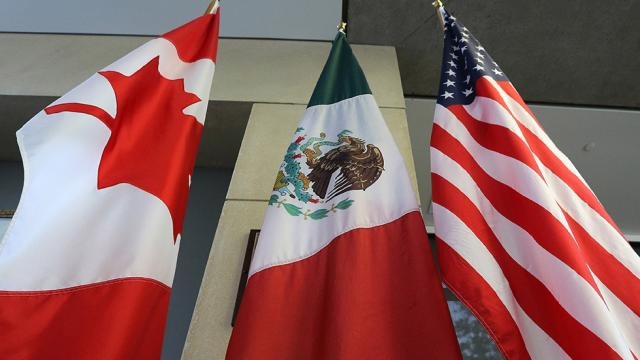
Flags are pictured during the fifth round of NAFTA talks involving the United States, Mexico and Canada, in Mexico City, November 19, 2017. /Reuters Photo
Flags are pictured during the fifth round of NAFTA talks involving the United States, Mexico and Canada, in Mexico City, November 19, 2017. /Reuters Photo
There is concern that Trump will terminate the 23-year-old deal after the seventh round of talks conclude later this month.
Fred Teng, president of the America China Public Affairs Institute, said Trudeau's visit comes at a time when the US is turning inward and NAFTA talks are in limbo.
China, the world's second-largest economy and a booming consumer market, has come out at the top of Canadian decision-makers' list of alternatives, Teng told CGTN.
Canada joined the Beijing-proposed Asian Infrastructure Investment Bank (AIIB) in March, leaving the US and Japan the only G7 nations not to participate.
While a deeper economic relationship with China will benefit Canadians, Teng said that America is still Canada's most important trading partner, accounting for over three-quarters of Canada's exports.
And US direct investment in Canada amounts to some 306 billion US dollars, representing almost 20 percent of Canada's GDP.
Climate change
Climate change is another topic China and Canada agreed on, with Li and Trudeau issuing a joint statement on climate change and clean energy following talks.
The two leaders said they both agree growing the economy and climate protection must go hand in hand.
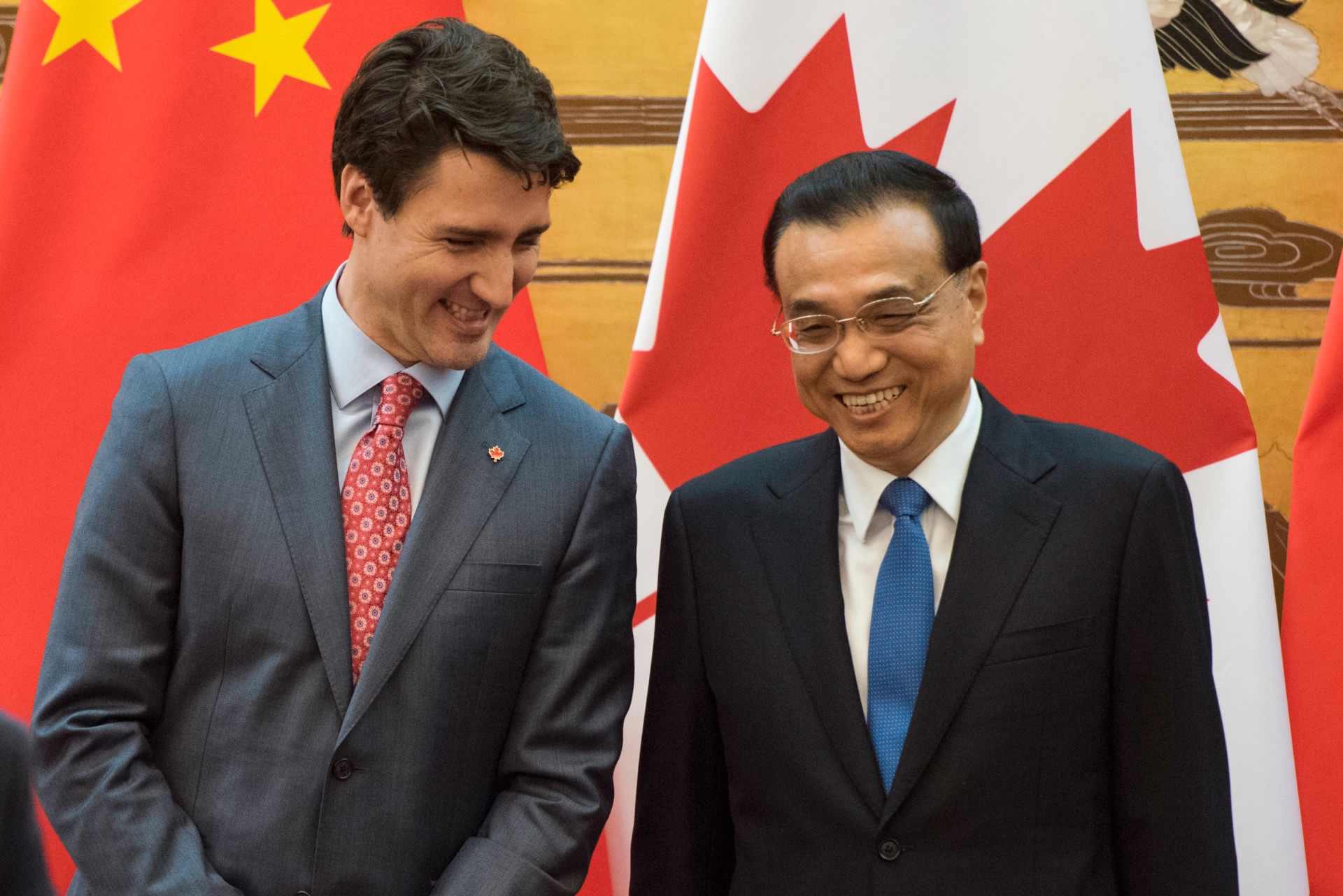
Chinese Premier Li Keqiang and Canadian Prime Minister Justin Trudeau speak during a signing ceremony at the Great Hall of the People in Beijing Monday, December 4, 2017. /AP Photo
Chinese Premier Li Keqiang and Canadian Prime Minister Justin Trudeau speak during a signing ceremony at the Great Hall of the People in Beijing Monday, December 4, 2017. /AP Photo
Despite Trump's plans to withdraw from the landmark Paris Agreement, China and Canada remain committed to fully implement the pact and both countries plan to hold regular meetings on the issue, the statement said.
Year of China-Canada tourism
To promote the year of China-Canada tourism in 2018, Trudeau took part in an event on Monday at the headquarters of Sina Corporation, which owns one of China's most popular social media platform, Weibo.
Trudeau is also a registered Weibo user with some 160,000 followers.
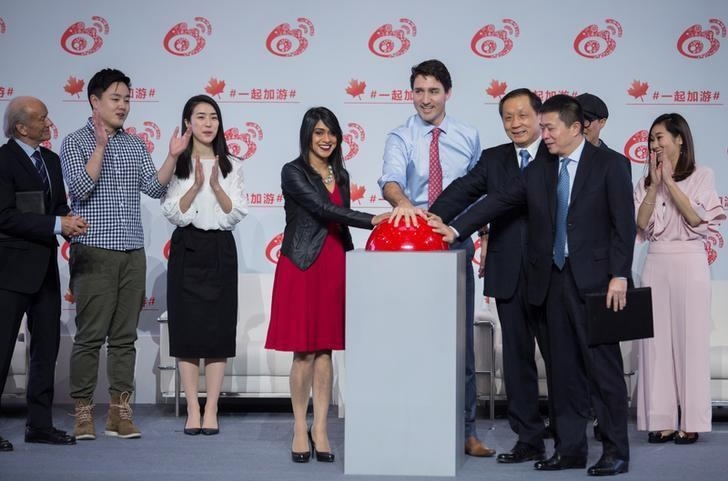
Canadian Prime Minister Justin Trudeau attends an event at the Sina Weibo headquarters in Beijing,December 4, 2017. /Reuters Photo
Canadian Prime Minister Justin Trudeau attends an event at the Sina Weibo headquarters in Beijing,December 4, 2017. /Reuters Photo
A growing number of young people have followed Trudeau's visit online, with thousands reposting and commenting after he promoted the year of China-Canada tourism on Weibo.
Trudeau said he was looking forward to welcoming more Chinese visitors to Canada.
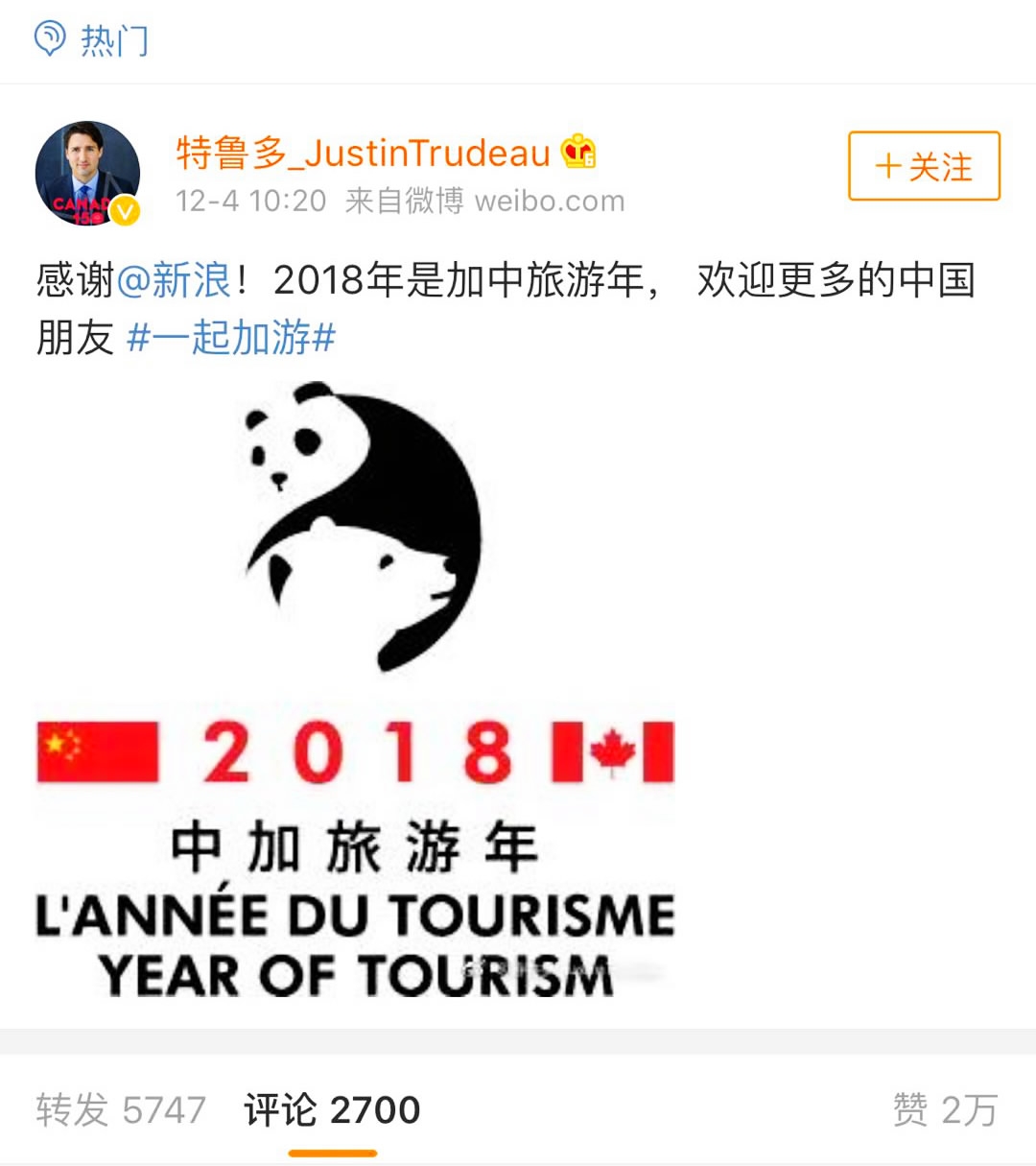
Screenshot of Justin Trudeau's weibo post.
Screenshot of Justin Trudeau's weibo post.
Tourism accounts for 20 billion US dollars in revenue in Canada, of which roughly 1.2 billion US dollars comes from China.
From 2010 to 2016, the number of Chinese people visiting Canada more than tripled from to 625,000 after China granted it approved destination status in 2009.
Trudeau traveled to Guangzhou on Wednesday to attend the Fortune Global Forum there.

